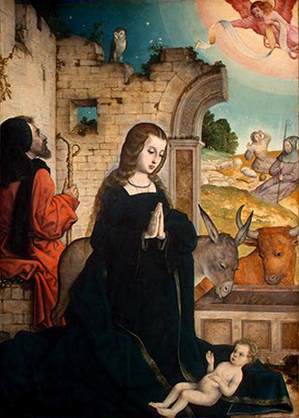
Have we finished the Christmas season in good order? Have we exceeded our expectation to live the season of Christmas differently from what secular culture has given us? Or, have we given up and just given ourselves over to the mediocrity of the the world around us with regard to Christian Faith? What follows is a very interesting commentary on our Christian observance of the Birth of Jesus, the Nativity of God-Man by Father Julián Carrón. While the today brings to a close the Church's yearly observance of Christmastide, we have work to do before we put to rest the nagging questions: what difference does this Child make in my life? AND Do we really believe that God is in our midst?
In order to describe our humanity and to see ourselves properly at this moment in the world's history, it is hard for us to find more appropriate words than those contained in this passage by the Prophet Zephaniah. "Sing aloud, O daughter of Zion; shout, O Israel!". Why? What reason is there to rejoice, with all that is happening in the world? Because "the Lord has taken away the judgments against you".
The first repercussion that these words produced in me was surprise at how the Lord looks at us: with a gaze that succeeds in seeing things that we shall not be able to recognize unless we participate in his same gaze at reality. "The Lord has taken away the judgments against you": in other words, your evil does not have the last word over your life; the usual way you look at yourself is not the right one; the look with which you constantly reproach yourself is not true. The one true look is the Lord's look. And it is precisely by this look that you will be able to understand that he is with you: if he has taken away the judgment against you, what can you fear? "You shall fear evil no more". An inexorable positiveness prevails over life. For this reason, the biblical passage continues, "do not fear, O Zion, do not let your hands grow weak" Why? Because "The Lord your God is in your midst, a warrior who gives victory". There is no other source of joy than this: "he will rejoice over you with gladness. He will renew you with his love, he will exult over you with loud singing" (3:14-17).
Let us ask ourselves: is Christianity a devout memory or an event that happens today exactly as it happened 2,000 years ago? Let us look at the many events continuously before our eyes that amaze and dumbfound us, starting with that impressive advent of Benedict XVI that never fails to stir us to our very depths. There is in our midst One who causes the "child" to leap, the child that each one of us carries in our innermost heart, in the depths of our being. This experience attests to us that the episode of the Visitation is not only an event of the past but was the beginning of a history that came down to us and continues to reach us in the same way, through our encounters, in the flesh and blood of all the people we meet on our way who move us in the depths of our being.
It is with this vision that we can enter the mystery of this Christmas, avoiding the risk of "devout commemoration", of reducing the Feast purely to an act of piety, to a sentimental devotion. Basically so often the temptation is to expect much of Christmas. But to those who are given the greatest grace imaginable, to see Christmas at work in the signs and events that document Jesus' presence, it is impossible to incur the risk of celebrating his birth as a "devout commemoration". This is not allowed! And not because we are better than our fellow humans, not because we are not frail as everyone is, but because we are continuously redeemed from what we lack by the power of the One who now comes and who has taken away the judgments against us.
It is only with these events in our eyes that we shall be able to look at Christmas which comes not with devout longing - but rather with the natural feelings that a newborn infant always kindles in us - nor with a vague religious sentiment but by virtue of an experience (since everything else produces nothing but a reduction of "that" birth). Who the Child is is revealed in this real experience: Elizabeth's son leaped with joy in her womb. It is the ceaseless renewal of this event that prevents us from diminishing Christmas and that can enable us to enjoy it as for the first time.
Father Julián Carrón
President of the Fraternity of Communion and Liberation
L'Osservatore Romano
24 December 2011


Leave a comment